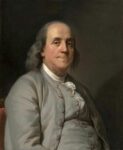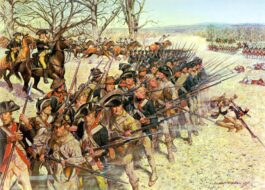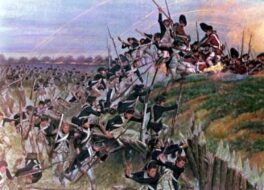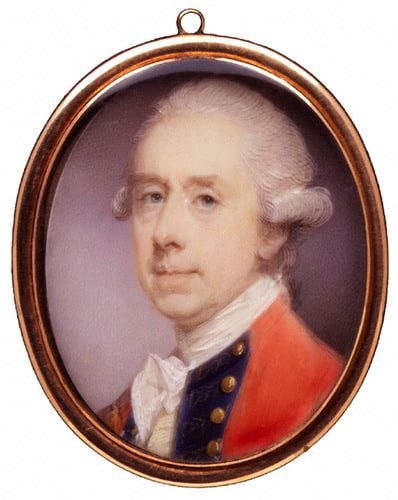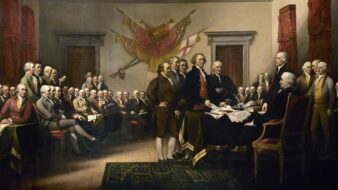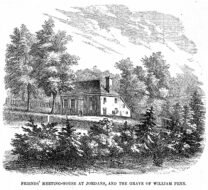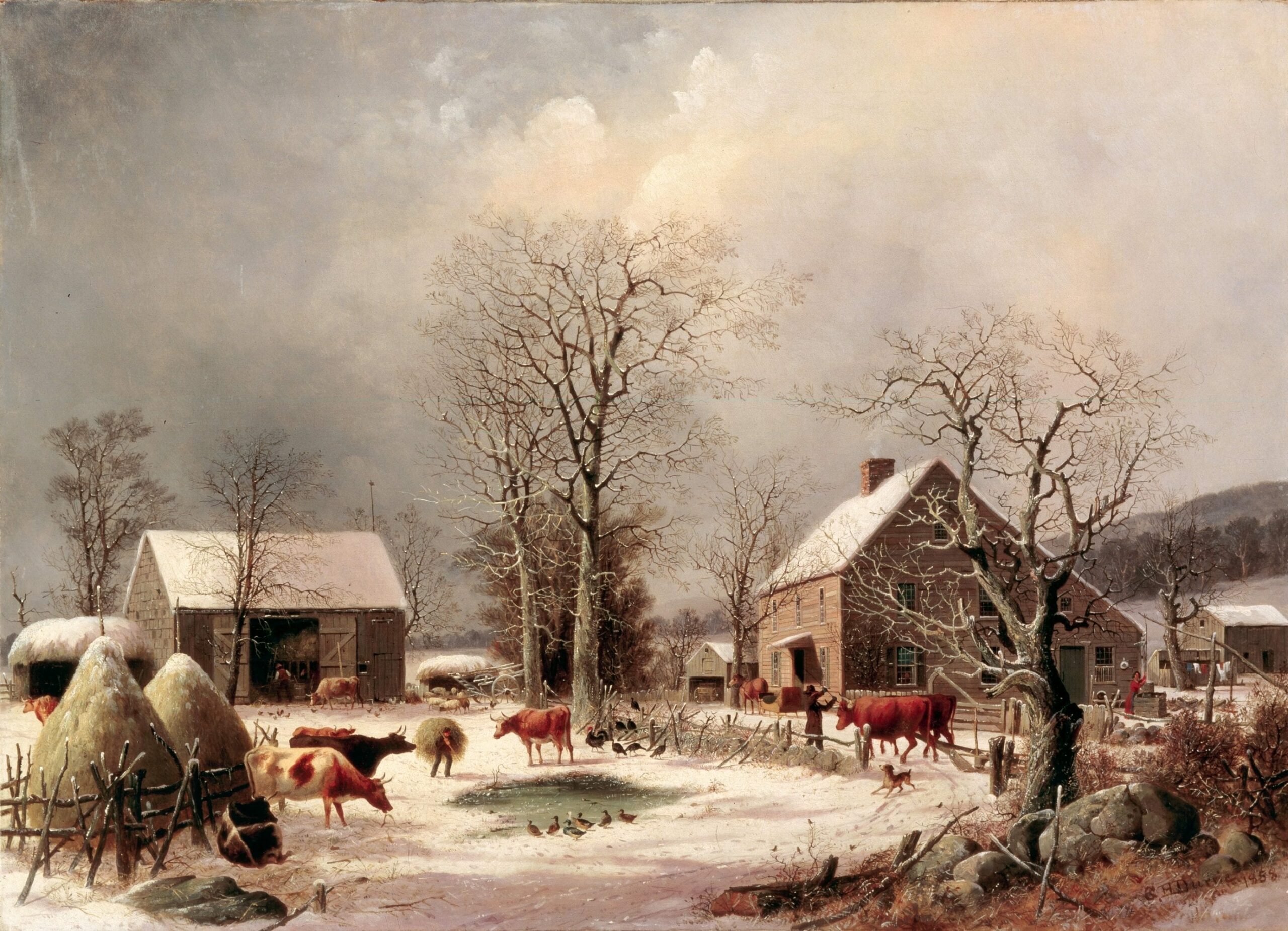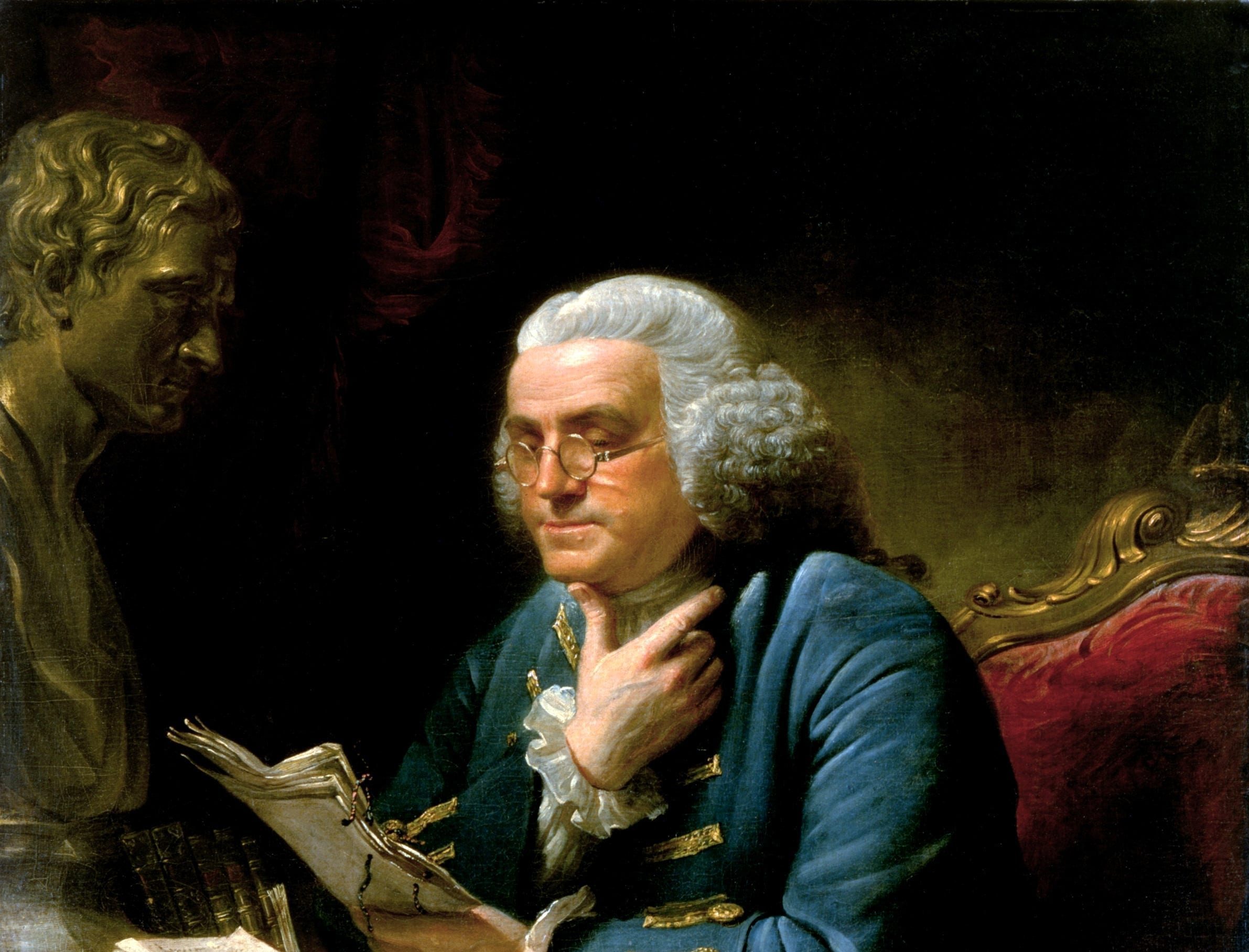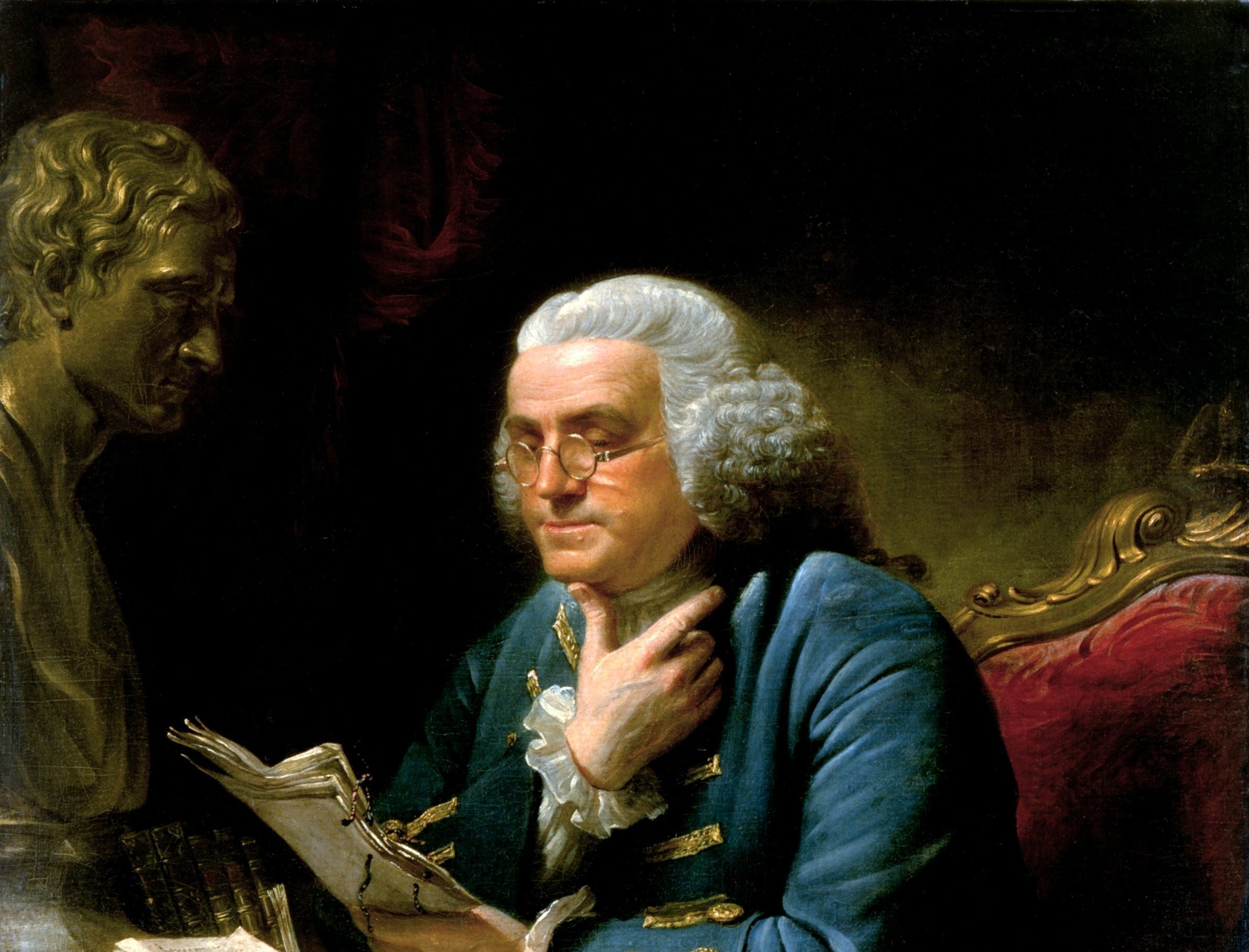
Introduction
News of Cornwallis’s surrender at Yorktown reached London on November 25, 1781. When Lord North (1732–1792) received word from Lord George Germain (1716–1785), his secretary of state for America, he exclaimed, “Oh God! It is all over.” Despite the prime minister’s assessment, George III remained unconvinced. After Parliament voted in favor of a resolution insisting that “the war in America be no longer pursued for the impractical purpose of reducing the inhabitants to obedience by force,” Lord North had to talk the king out of abdicating the throne—and into acquiescing to his own resignation as prime minister. The new government, headed by the Marquess of Rockingham (1730–1782), stood ready to acknowledge American independence and turned its attention toward the pursuit of peace.
Official negotiations began in July 1782. Scottish merchant Richard Oswald (1705–1784) represented the British. Benjamin Franklin (1706–1790), US ambassador to France, led a team of American negotiators that included Henry Laurens (1724–1792), John Adams (1735–1826), and John Jay (1745–1829). Although the Continental Congress instructed Franklin to work with France, which also needed to negotiate peace with Britain, Franklin understood that the interests of America’s European allies diverged from its own. Spain, for example, would also be part of the settlement; it viewed the US as a potential competitor in North America, and sought control of all British land west of the Appalachians and east of the Mississippi River.
Sensing that Britain feared a strong United States less than it did a strengthened France and Spain, Franklin worked directly with Oswald to reach an agreement so favorable to America that British criticism prompted Oswald to resign. He was replaced by David Hartley (1732–1813). In September 1783, when agreements had been readied between Britain and all the other belligerents, the Treaty of Paris was signed. The British had recognized the independence of the United States. Seemingly against all odds, Americans had won the Revolutionary War.
Source: Richard Peters, et al., eds., The Public Statutes at Large of the United States of America, 17 vols. (Boston: Charles C. Little and James Brown, 1845–73), 8:80–83. https://archive.org/details/publicstatutesa04statgoog/page/n98
In the name of the Most Holy and Undivided Trinity.[1]
IT having pleased the Divine Providence to dispose the hearts of the most serene and most potent Prince GEORGE the Third, by the Grace of God King of Great Britain, France and Ireland, Defender of the Faith, Duke of Brunswick and Lüneburg, Arch-Treasurer and Prince Elector of the Holy Roman Empire, etc., and of the UNITED STATES OF AMERICA, to forget all past misunderstandings and differences that have unhappily interrupted the good correspondence and friendship which they mutually wish to restore; and to establish such a beneficial and satisfactory intercourse between the two countries, upon the ground of reciprocal advantages and mutual convenience, as may promote and secure to both perpetual peace and harmony; and having for this desirable end, already laid the foundation of peace and reconciliation, by the provisional articles, signed at Paris, on the thirtieth of November, one thousand seven hundred and eighty-two, by the commissioners empowered on each part, which articles were agreed to be inserted in, and to constitute the treaty of peace proposed to be concluded between the crown of Great-Britain and the said United States, but which treaty was not to be concluded until terms of peace should be agreed upon between Great Britain and France, and his Britannic Majesty should be ready to conclude such treaty accordingly; and the treaty between Great-Britain and France, having since been concluded, his Britannic Majesty and the United States of America, in order to carry into full effect the provisional articles abovementioned, according to the tenor thereof, have constituted and appointed, that is to say, His Britannic Majesty on his part, David Hartley, Esquire, Member of the Parliament of Great Britain; and the said United States of America on their part, John Adams, Esqr., late a commissioner of the United States of America at the Court of Versailles, late Delegate in Congress from the state of Massachusetts, and Chief Justice of the said state, and Minister Plenipotentiary of the said United States to their High Mightinesses, the States General of the United Netherlands; Benjamin Franklin, Esquire, late Delegate in Congress from the state of Pennsylvania, President of the Convention of the said state, and Minister Plenipotentiary from the United States of America at the Court of Versailles; John Jay, Esquire, late President of Congress, and Chief Justice of the state of New York, and Minister Plenipotentiary from the said United States at the Court of Madrid to be the plenipotentiaries for the concluding and signing the present definitive treaty; who after having reciprocally communicated their respective full powers, have agreed upon and confirmed the following articles.
ARTICLE I.
His Britannic Majesty acknowledges the said United States—that is, New Hampshire, Massachusetts Bay, Rhode Island and Providence Plantations, Connecticut, New York, New Jersey, Pennsylvania, Delaware, Maryland, Virginia, North Carolina, South Carolina, and Georgia—to be free, sovereign, and independent States; that he treats with them as such; and for himself, his heirs, and successors, relinquishes all claims to the government, propriety, and territorial rights of the same, and every part thereof.
ARTICLE II.
And that all disputes which might arise in [the] future, on the subject of the boundaries of the said United States may be prevented, it is hereby agreed and declared, that the following are, and shall be their boundaries: From the northwest angle of Nova-Scotia, that is, that angle which is formed by a line, drawn due north from the source of St. Croix River to the highlands; along the said highlands which divide those rivers, that empty themselves into the river St. Lawrence, from those which fall into the Atlantic ocean, to the northwesternmost head of Connecticut River, thence down along the middle of that river, to the forty-fifth degree of north latitude; from thence, by a line due west on said latitude, until it strikes the river Iroquois or Cataraqui; thence along the middle of said river into Lake Ontario, through the middle of said lake until it strikes the communication by water between that lake and Lake Erie; thence along the middle of said communication into Lake Erie, through the middle of said lake until it arrives at the water communication between that lake and Lake Huron; thence through the middle of said lake to the water communication between that lake and Lake Superior: thence through lake Superior northward of the isles Royal and Phelipeaux, to the Long Lake; thence through the middle of said Long Lake, and the water communication between it and the Lake of the Woods, to the said Lake of the Woods; thence through the said lake to the most northwestern point thereof, and from thence on a due west course to the river Mississippi; thence by a line to be drawn along the middle of the said river Mississippi; thence by a line to be drawn along the middle of the said river Mississippi until it shall intersect the northernmost part of the thirty-first degree of north latitude. South by a line to be drawn due east from the determination of the line last mentioned, in the latitude of thirty-one degrees north of the Equator, to the middle of the river Apalachicola or Chattahoochee; thence along the middle thereof to its junction with the Flint River; thence strait to the head of St. Mary’s River; and thence down along the middle of St. Mary’s River to the Atlantic Ocean. East by a line to be drawn along the middle of the river St. Croix, from its mouth in the Bay of Fundy to its source, and from its source directly north to the aforesaid highlands which divide the rivers that fall into the Atlantic Ocean, from those which fall into the river St. Lawrence; comprehending all islands within twenty leagues of any part of the shores of the United States, and lying between lines to be drawn due east from the points where the aforesaid boundaries between Nova Scotia on the one part, and East Florida on the other, shall respectively touch the Bay of Fundy and the Atlantic ocean; excepting such islands as now are, or heretofore have been within the limits of the said province of Nova Scotia.
ARTICLE III.
It is agreed that the people of the United States shall continue to enjoy unmolested the right to take fish of every kind on the Grand Bank, and on all the other banks of Newfoundland; also in the Gulf of St. Lawrence, and at all other places in the sea, where the inhabitants of both countries used at any time heretofore to fish; and also that the inhabitants of the United States shall have liberty to take fish of every kind on such part of the coast of Newfoundland as British fishermen shall use (but not to dry or cure the same on that island); and also on the coasts, bays, and creeks of all other of his Britannic Majesty’s dominions in America; and that the American fishermen shall have liberty to dry and cure fish in any of the unsettled bays, harbors, and creeks of Nova Scotia, Magdalen Islands, and Labrador, so long as the same shall remain unsettled; but so soon as the same or either of them shall be settled, it shall not be lawful for the said fishermen to dry or cure fish at such settlement, without a previous agreement for that purpose with the inhabitants, proprietors, or possessors of the ground.
ARTICLE IV.
It is agreed that creditors on either side, shall meet with no lawful impediment to the recovery of the full value in sterling money, of all bona fide debts heretofore contracted.
ARTICLE V.
It is agreed that the Congress shall earnestly recommend it to the legislatures of the respective states, to provide for the restitution of all estates, rights, and properties, which have been confiscated, belonging to real British subjects, and also of the estates, rights, and properties of persons resident in districts in the possession of his Majesty’s arms, and who have not borne arms against the said United States. And that persons of any other description shall have free liberty to go to any part or parts of any of the thirteen United States, and therein to remain twelve months, unmolested in their endeavors, to obtain the restitution of such of their estates, rights, and properties, as may have been confiscated; and that Congress shall also earnestly recommend to the several states a reconsideration and revision of all acts or laws regarding the premises, so as to render the said laws or acts perfectly consistent, not only with justice and equity, but with that spirit of conciliation, which on the return of the blessings of peace should universally prevail. And that Congress shall also earnestly recommend to the several states, that the estates, rights, and properties of such last mentioned persons, shall be restored to them, they refunding to any persons who may be now in possession, the bona fide price (where any has been given) which such persons may have paid on purchasing any of the said lands, rights, or properties, since the confiscation. And it is agreed, that all persons who have any interest in confiscated lands, either by debts, marriage settlements, or otherwise, shall meet with no lawful impediment in the prosecution of their just rights.
ARTICLE VI.
That there shall be no future confiscations made, nor any prosecutions commenced against any person or persons for… the part which he or they may have taken in the present war; and that no person shall, on that account, suffer any future loss or damage, either in his person, liberty, or property; and that those who may be in confinement on such charges, at the time of the ratification of the treaty in America, shall be immediately set at liberty, and the prosecutions so commenced be discontinued.
ARTICLE VII.
There shall be a firm and perpetual peace between his Britannic Majesty and the said States, and between the subjects of the one and the citizens of the other, wherefore all hostilities, both by sea and land, shall from henceforth cease. All prisoners on both sides shall be set at liberty, and his Britannic Majesty shall, with all convenient speed, and without causing any destruction, or carrying away any Negroes or other property of the American inhabitants, withdraw all his armies, garrisons, and fleets from the said United States, and from every post, place, and harbor within the same; leaving in all fortifications the American artillery that may be therein; and shall also order and cause all archives, records, deeds, and papers, belonging to any of the said states, or their citizens, which in the course of the war may have fallen into the hands of his officers, to be forthwith restored and delivered to the proper states and persons to whom they belong.
ARTICLE VIII.
The navigation of the river Mississippi, from its source to the ocean, shall forever remain free and open to the subjects of Great Britain and the citizens of the United States.
ARTICLE IX.
In case it should so happen that any place or territory belonging to Great Britain or to the United States should have been conquered by the arms of either from the other, before the arrival of the said provisional articles in America, it is agreed, that the same shall be restored without difficulty, and without requiring any compensation.
ARTICLE X.
The solemn ratifications of the present treaty, expedited in good and due form, shall be exchanged between the contracting parties, in the space of six months, or sooner if possible, to be computed from the day of the signature of the present treaty. In witness whereof, we the undersigned, their ministers plenipotentiary, have in their name and in virtue of our full powers, signed with our hands the present definitive treaty, and caused the seals of our arms to be affixed thereto.
Done at Paris, this third day of September, in the year of our Lord one thousand seven hundred and eighty-three.
D. HARTLEY (L. S.)[2]
JOHN ADAMS (L. S.)
B. FRANKLIN (L. S.)
- 1. Trinity: in most Christian religions, the term used to refer to the three “persons” or natures of God—Father, Son, and Holy Spirit—who are distinct from one another and yet unified as the diety.
- 2. L. S.: Abbreviation for locus sigilli (Latin), meaning “the place of the seal.” Each of the four representatives signed his name above a wax seal.
Letter from George Washington to James Duane (1783)
September 07, 1783
Conversation-based seminars for collegial PD, one-day and multi-day seminars, graduate credit seminars (MA degree), online and in-person.
